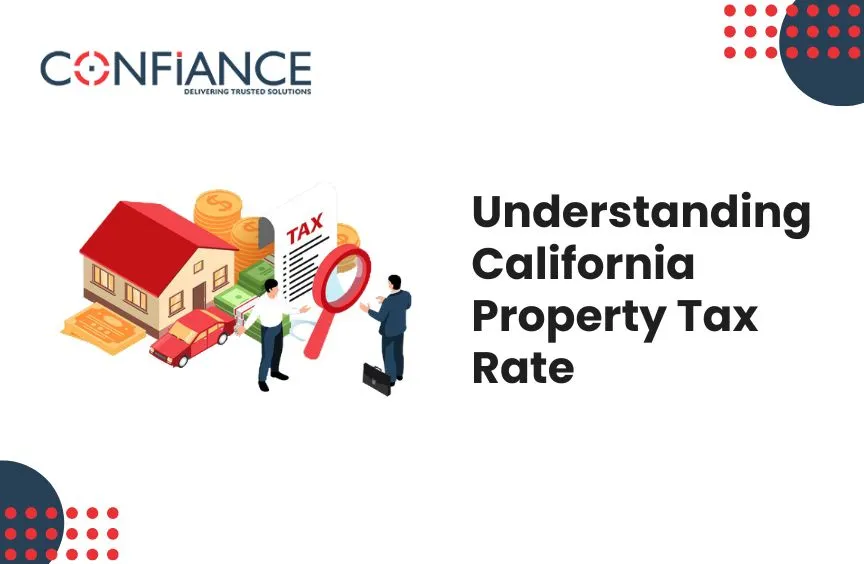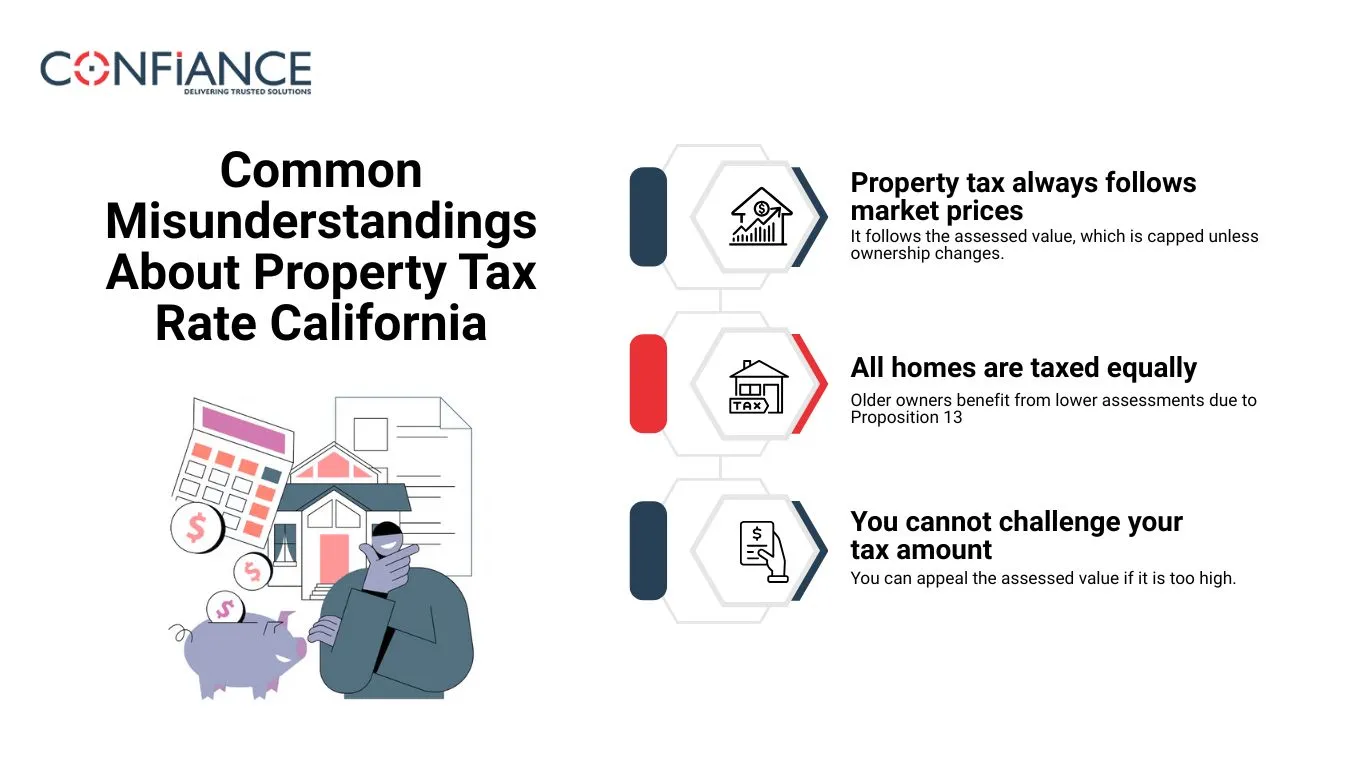
Understanding California Property Tax Rate
The California property tax rate often confuses homeowners. Many do not know what factors affect their bill. If you own property in California or plan to buy one, understanding how the system works will help you manage costs and avoid surprises. This guide explains how the property tax rate in California is calculated, what influences it, and how to stay informed.
What Is the California Property Tax Rate
The standard California property tax rate is 1 percent of the property’s assessed value. This rule comes from Proposition 13, a law passed in 1978. It limits the base property tax rate in California to one percent of a home’s value when purchased.
However, this is not the final amount you pay. Local governments can apply extra charges approved by voters. These additional costs fund public schools, safety services, and other community needs. Because of these charges, the actual property tax rate in California usually ranges between 1.1 percent and 1.25 percent.
How Assessed Value Affects Property Tax Rate in California
The assessed value is the value used to calculate the California property tax rate. It is usually the amount you paid for the property. After the first year, the county can only increase this value by a maximum of 2 percent each year, regardless of market prices. This keeps tax growth predictable and affordable for most property owners.
For example, if you buy a house for 700000 dollars, the assessed value starts at 700000 dollars. Your base property tax rate California bill would be one percent of that, or 7000 dollars. If the value increases by two percent next year, your new assessment becomes 714000 dollars, and your base tax would be 7140 dollars.
When Property Value Gets Reassessed
The property tax rate California law resets the assessed value only when:
- A property is sold or ownership is transferred
- Major improvements or new construction is added
These events cause a reassessment to the current market value. This is when many property owners see a larger increase in their tax bill.
Supplemental Property Tax Explained
If you buy a new home in California, you might receive a supplemental property tax bill. This happens because your home’s value likely changed compared to what the previous owner paid.
The supplemental tax covers the difference between the old and new assessed values. It applies only to the period between the purchase date and the start of the next tax year. This tax is a one-time charge but often surprises first-time buyers.
Local Taxes That Affect Property Tax Rate California
The base California property tax rate is fixed at one percent. But your final tax bill depends on local tax rates too. These are added to fund services such as:
- Public schools
- Road improvements
- Water treatment projects
- Emergency services
- Libraries and parks
Every county, city, or district can vote to add bonds or fees. These additional amounts raise your total tax rate above the one percent base. Most homeowners end up paying between 1.1 and 1.25 percent of the home’s value each year.
Example of Property Tax Calculation
Let’s say you buy a house in Orange County for 800000 dollars. Your California property tax rate breakdown might look like this:
- One percent base rate: 8000 dollars
- Local tax add-ons (0.2 percent): 1600 dollars
- Total property tax: 9600 dollars
- Effective rate: 1.2 percent
This is typical across much of the state. The total rate depends on which district the home is in.
Property Tax Exemptions in California
Some property owners can lower their tax bill with exemptions. These include:
Homeowners Exemption
This exemption reduces the assessed value of a home used as a primary residence by 7000 dollars. That lowers the tax bill by around 70 dollars each year. You must live in the home to apply.
Disabled Veterans Exemption
Veterans with a service-connected disability may qualify for larger exemptions. The exact amount depends on disability rating and income level.
Senior Citizens Property Tax Postponement
This program allows seniors aged 62 or older to delay property tax payments. To qualify, your income must be below a certain amount. The state pays your taxes, and the amount is collected when the home is sold or transferred.
How Proposition 19 Changed Inherited Property Rules
Before 2021, property could be passed from parents to children without reassessment. Under Proposition 19, this rule changed.
Now, a child must live in the home as a primary residence to avoid reassessment. Even then, the new rule allows for only a 1 million dollar exclusion above the assessed value. If the home is worth more, the excess is reassessed at market value. This means higher property taxes for many inherited homes.
Appealing an Assessment in California
If you believe your property’s assessed value is too high, you can file an appeal with the county assessor. You need to provide proof that the market value of your home is lower than the assessed amount.
Appeals usually involve:
- Comparable recent sales
- A private appraisal
- Photos showing damage or changes
Each county has its own rules, but most allow appeals between July and November. If the appeal is approved, your California property tax rate will be applied to the lower value.
When Are California Property Taxes Due
California property taxes are paid in two installments each year:
- First installment is due November 1 and is late after December 10
- Second installment is due February 1 and is late after April 10
Missing these deadlines leads to penalties, usually 10 percent of the amount owed.
How to Pay Property Taxes in California
You can pay your property taxes through:
- The county tax collector’s website
- By mail using a check
- In person at the county office
- Through your mortgage company, if they collect taxes with your monthly payment
Most homeowners use mortgage impound accounts. In this setup, the lender collects money each month and pays the tax bill when due.
Where California Property Tax Money Goes
Revenue from property tax in California supports many services, including:
- Public schools
- Community colleges
- Police and fire departments
- Road repairs
- City and county administration
A large portion of each tax dollar goes to K–12 education. This makes the California property tax rate essential for supporting public services.
Why Property Taxes Vary Between Neighbors
You might see two similar homes with very different tax bills. The difference is usually due to purchase date. Older homes have much lower assessed values thanks to the two percent cap under Proposition 13.
A person who bought a home in 2000 for 300000 dollars might still be paying property taxes on that value, even if the home is now worth 900000 dollars. Someone buying the same home today will be taxed on the full current value.
What About Commercial Property
Commercial properties also follow Proposition 13. They are reassessed only when there is a change in ownership. This has kept taxes low for many large businesses. There have been proposals to split the tax rolls and reassess commercial property more often, but no major law has passed yet.
Common Misunderstandings About Property Tax Rate California

Myth: Property tax always follows market prices
No. It follows the assessed value, which is capped unless ownership changes.
Myth: All homes are taxed equally
Not true. Older owners benefit from lower assessments due to Proposition 13.
Myth: You cannot challenge your tax amount
Wrong. You can appeal the assessed value if it is too high.
Understanding the California property tax rate helps you manage one of the largest costs of owning a home. The one percent base rate seems simple, but local add-ons, reassessment rules, and exemptions all affect what you actually pay.
Keep track of your assessed value, check for exemptions, and watch for local measures that may raise rates in your area. This way, you can plan your budget and avoid surprises with your property tax rate California bill.
FAQs
- What is the current California property tax rate
The base rate is one percent of assessed value. With local taxes, most homeowners pay between 1.1 percent and 1.25 percent. - How often does the assessed value change in California
It increases by no more than two percent per year unless the property is sold or improved. - Why is my neighbor paying less property tax than I am
They may have owned their home longer. Their assessed value is likely lower due to the two percent cap under Proposition 13. - Can I reduce my California property tax rate
Yes. You can apply for exemptions or appeal if your assessed value is too high. - What is the due date for property tax in California
The first installment is due on November 1 and the second on February 1. Late fees apply if unpaid by December 10 or April 10. - What is a supplemental tax bill in California
It is a separate bill that adjusts for the difference between the old and new assessed values after a property is sold.
